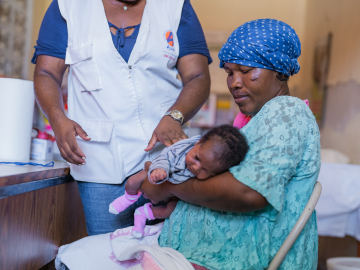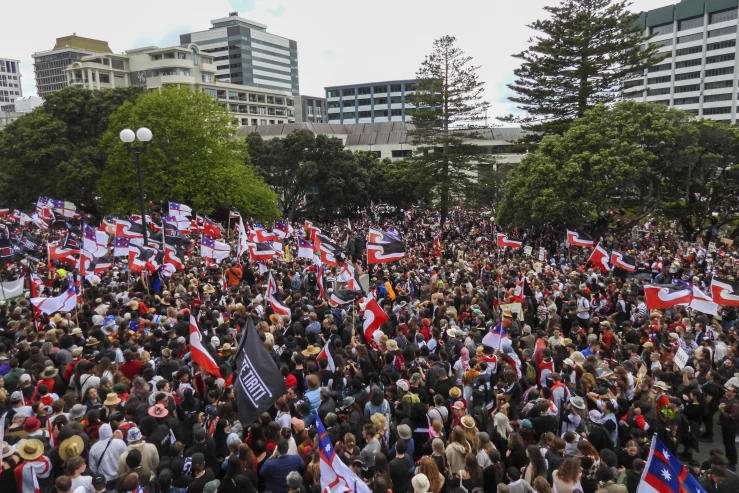
Detaining Newborns: A Mother’s Heartbreaking Experience in Warri, Nigeria
WARRI, Nigeria – Akpesiri Ojiko, 36, smiled down at her nine months old daughter, Dew, sitting outside her home here in Warri, one of the biggest cities in Delta State, Nigeria. Her twin brother, Sheriff, was strapped securely on her back, while his mother ran her fingers through Dew’s hair as she recalled her trying moments as a mother to three.
On a Friday late last November 2022, two days after Ojiko delivered twins at the Central Hospital—a government-run facility where she thought services were economical—was happy to take home her babies.
“I asked how the babies were, and was told to go up to the top floor. But when I got there, all I saw was my son,” she recalled. The wardmaster at the public hospital told Ojiko that her daughter has been transferred to Unique Health Medical Centre, the private clinic in town, as there was no space for her in the public hospital. Moved to see her baby girl, she came to the private clinic and received a bill for 433,500 naira ($545).
Ojiko was stunned.
Her husband abandoned the family when he saw the bill, and they ultimately separated. (While Nigerian federal law assigns Detaining newborns is the new reality for several families today as can be clearly seen in the Akpesiri Ojiko case.
Detaining newborns generally always means the outcome is most often distressing, especially in cases where fathers avoid fulfilling their financial obligations.
Detaining newborns might mean that the families suffer a terrible blow emotionally and financially as in the case of Ojiko, who endeavors to feed her family with the sum of 25,000 naira, or $31 per month from selling a commodity called Usi – a starchy edible considered a local delicacy.
Such private clinics, as is the case of Ojiko’s daughter Dew, keep newborn babies, thereby keeping her baby girl stuck for the first seven weeks of her life in the hospital for failure to settle an unpaid bill.
Holding newborns as their parents fight to make ends meet just exacerbates the pain, Ojiko was able to collect 50,000 naira ($63) to offset some of the expenses, but the hospital refused her offer to pay in installments, insisting that she settle in full and take the baby home.
Detaining newborns under such conditions left Ojiko hopeless: “It was one of the most torturous times of my life,” she recalls. Detaining newborns in such conditions pushed her to the edge, since she had to beg families and relatives for money.
Detaining newborns during her visits, it often set her back seeing Dew lying alone on a hospital bed, intensifying the emotional toll on her already strained heart.
“Sometimes she would cry with nobody to comfort her. Whenever I came to visit her, since it was time to feed or change the diaper, the doctor would tell me to leave, saying that if I could not pay, he would take my baby to an orphanage. The whole situation made me feel worthless,” Ojiko shared. Unique Health Medical Centre did not respond to Global Hub 360’s request for comment.

Detaining newborn
Imprisoning new mothers and babies for nonpayment of hospital bills is a violation of international human rights, says Sarah Bosha a visiting professor of law at the O’Neill Institute for National and Global Health Law at Georgetown University.
Detaining newborns
“Their freedom of movement and their right to liberty is infringed upon,” she says.
Still, detentions remain surprisingly common in low-income countries where emergency health care isn’t free or insured. Hospitals rarely document the illegal practice, making it hard to track, but one 2019 study found evidence of
the practice in 46 countries, including Nigeria. The think tank Chatham House estimates that hundreds of thousands of people in parts of Africa and Asia may be affected every year by such detentions.
The impact of detaining newborns on mothers and their infants is particularly severe during those crucial days and weeks immediately after birth. This treatment is alarming because it would amount to “cruel, inhuman and degrading treatment”; it inflicts grave mental distress on new mothers and separates them from the effective familial support systems necessary for recovery after childbirth.
Detaining newborns
As Bosha, an advocate for accountability and justice over violation of health rights, is asserting in this case, this is not only an emotional torture on the mothers, but also impacts the very crucial bonding hours between mothers and their newborns.
Separating a mother from her infant in the days and weeks after birth, studies show, not only interrupts bonding, it can undermine a mothers’ sense of maternal competency.
Bosha points out that “despite the many international agreements signed by most nations with intent to protect women, it is still largely failing to bring an end to harmful practices.”.
“African nations must take more decisive action to protect women’s human rights within healthcare settings,” she asserts.
Detaining newborns
In June 2023, the Maputo Protocol has been ratified by 44 of 55 African countries. This protocol prohibits all practices proven or generally known to be harmful, especially those that cause tortures or cruelties, mutilations, or serious, illegitimate interference with a woman’s health. States are further bound to take appropriate measures to eliminate all forms of exploitation of women and to ensure equal access for women to education, health, and nutrition. States also have an obligation to protect women who are poor and from other disadvantaged groups.
While some survivors have received favorable judgments in the courts, the call to African countries is to pass laws that cannot detain patients for unpaid hospital bills, especially with regard to pre- and postnatal care, she stresses.
Nigerian women already face Detaining newborns means that significant barriers to access in health care lie between mothers and their babies, who are then exposed to increased risks of detention-or even the fear of the same consequences drives women away from seeking care altogether.
Detaining newborns instills concerns for women as far as possible future financial burdens they might incur when receiving medical treatment.
According to data from the country’s National Bureau of Statistics for 2018–2019, while 14.8% of individuals who chose not to go for medical treatment in a health facility cited financial reasons as the main concern, the majority listed this factor as the least important among several reasons.
While no official statistics are available on the status quo, Tanimola Akande, a professor of public health from the University of Ilorin in Kwara State, North Central Nigeria, said that “patient detention is an unfortunate practice on the rise” in both public and private hospitals. This worrying development is indeed compounded by mounting poverty, an ever-growing population, and a now long-neglected health sector in Nigeria.
Raymond Kuti is the president of the Guild of Medical Directors, an organisation of doctors who own and run private hospitals and clinics across Nigeria. He said doctors owe a responsibility to attend to any patient’s needs even if payment in the first instance was not made. But he underscored they get little or no help to recover costs when patients cannot pay for their services.

Detaining newborns
Unfortuntely, most people think of private hospitals as social service providers rather than recognizing them as socially oriented business ventures,” states Kuti. He says private hospitals receive no financial or policy assistance from any level of government and have become targets for criticism, suffering multiple taxes and regulations on top of the burden of patients unwilling to pay.
In May 2020, at the peak of the Covid-19 pandemic, Blessing Abosede had cesarean delivery in a public health facility. At close to delivery time, Abosede felt uneasy when she did not see her husband in the delivery ward, and the hospital presented to her a medical bill amounting to 150,000 naira ($188). Unable to pay the bill, she and her newborn are confined with three other women in a dirty small room at Wesley Guild Hospital in Ilesa, Southwest Nigeria for 21 days.
They have not received any other form of medical care and treatment, and most of the time, an obnoxious smell from the toilet overhangs them.
Detaining newborns
During her detention, Abosede had her grandmother bring food to her. The food was often tasteless pap-an assortment of fermented cereal puddings. She was given a handful of Akara, a local bean cake, or sometimes, a bowl of rice and beans.
In fact, the hospital staff stopped treatment and only came around to remind us that if we didn’t pay, we wouldn’t be allowed to leave,” she recalled. The grandmother says it’s absolutely traumatizing. And my grandmother, all the running around for money, begging in the middle of a pandemic just so we could settle the bill.
Nigeria government condemned the hospitals for holding the patients up in detention if they would not raise money to pay for their stay, especially patients of limited socio-economic status. Still, as 70% of Nigerians pay out-of-pocket to access healthcare, Akande argues that it goes one step further: “The government should improve insurance coverage of vulnerable people.”. He said that there needed to be a huge increase in budgetary allocations aimed at improving access to quality health care services.
The government has pledged to do just that, expanding state-run health services to give more Nigerians access to affordable care, and signing into law last year a national policy that mandates health insurance for all Nigerians, and includes a fund to expand coverage to more than 83 million poor and vulnerable Nigerians who cannot afford health insurance premiums.
Akande said the insurance law was a good idea but it is still being perfected. There is a long way to go before it caters for the most deprived Nigerians, he insists.
Patient detention will also only become a reality when at least 90% of the population falls under the national health policy.
“Crucially, this requires significant political will and commitment from government,” he underscored.
“Although some positive steps are being taken through the Basic Health Care Provision Fund—yet another national program designed to improve primary health services-this initiative falls far short of the necessary level of financial protection against catastrophic health expenditures.”
Until systemic changes are implemented, Abosede and other new mothers, and their newborn babies, will remain vulnerable to detention in the hospitals.
Abosede three-year-old son, Iyanu, is the light in her life, yet the memory of detaining newborns still hurts her heart. “I drew her son to herself, looking into the little one’s face while recounting her detention of newborns, laying him softly on her lap.”
“I would not wish that kind of pain on any mother whose newborn is detained,” she underscored.
For more visit : Global Health







